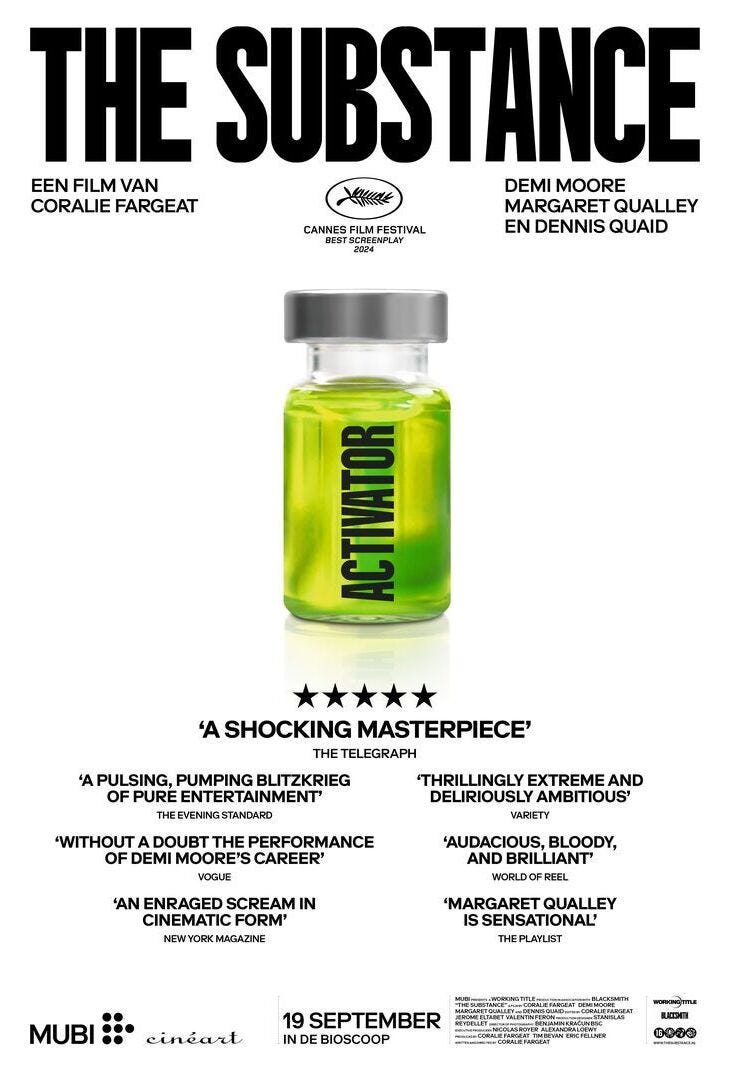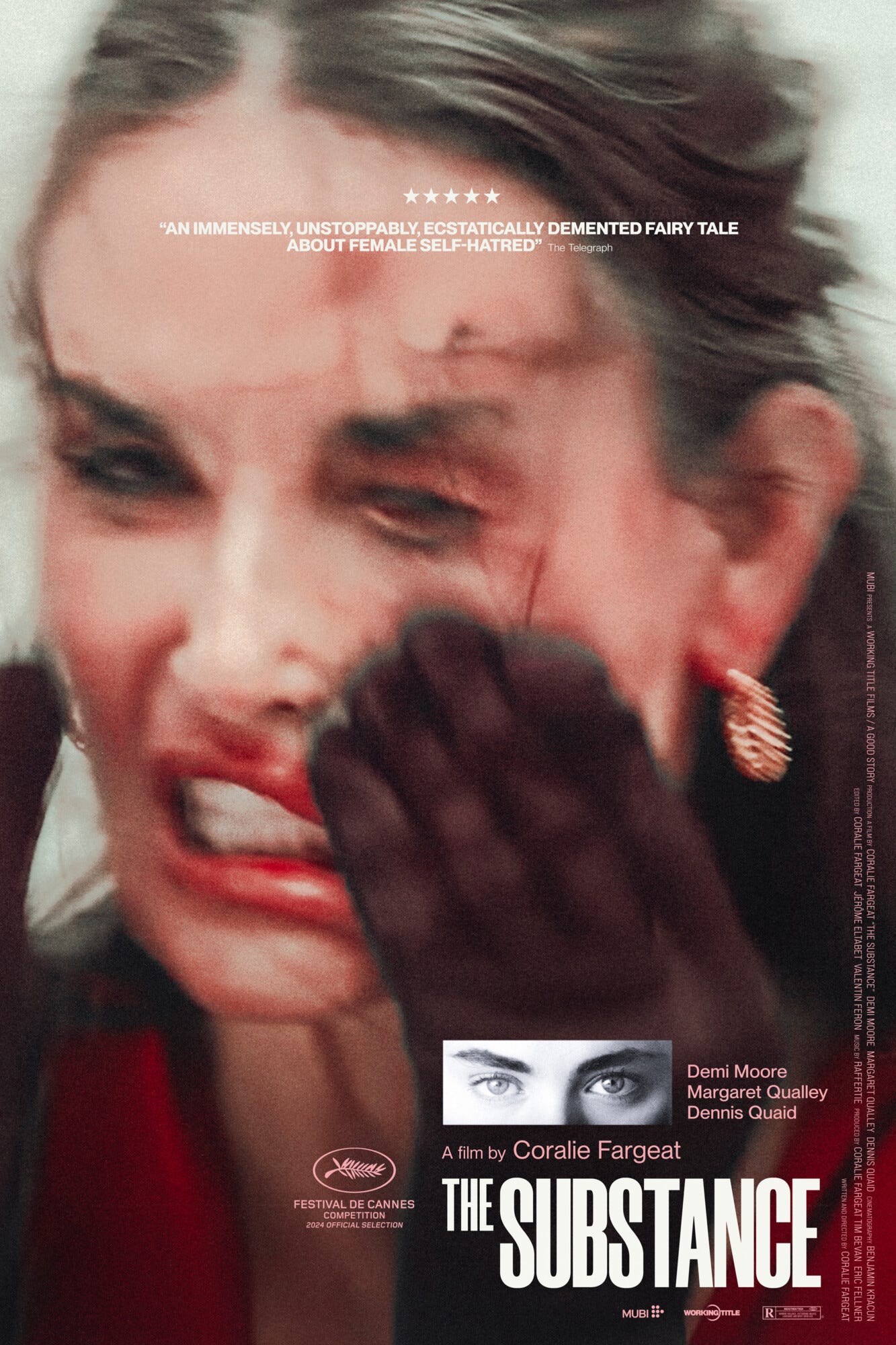The Substance: A Haunting Reflection on Perfection and Self-Hatred
On the unrelenting pursuit of being enough
“Have you ever dreamt about a better version of yourself? Younger, more beautiful, more perfect? One single injection unlocks your DNA starting the new cellular delivery that will release another version of yourself. This is… The Substance.”
I have been meaning to write about this movie and This morning, I woke up and decided: today’s the day I write about The Substance. I have so many thoughts around this movie, so make some delicious coffee/tea and take your time reading it.
If you haven't seen it yet, I’ll warn you now: spoilers ahead! But trust me, this is a movie worth experiencing firsthand. It is a rollercoaster of shocking gore, dark humor, and gut-wrenching moments that push emotional and visual boundaries. It's not an easy watch, but for those who dare, I truly believe this is a movie every person should see at least once in their lifetime.
Watching The Substance really brought back memories of me watching Requiem For A Dream for the first time as a 14 year old. I felt an almost unbearable discomfort: fidgeting in my seat with a tickling feeling inside of me, not wanting to continue but also unable to look away from what was happening. By the end, I found myself seated in an almost fetal-like position (which is how the characters all end up doing at the end of the movie). That’s how you know you have seen a good movie, you become one with the characters. Watching The Substance in the theater had the same effect on me.
The first moment the Substance was introduced as what it does and the instructions on how to use, I thought to myself “Sounds too good to be true… What’s the catch?”. Then they explained the process: You inject a dense green liquid with a big needle, a new version of you violently rips through your spine, you attach the two bodies to “feed” the new version with spinal fluid. As if that isn’t awful enough, for seven days, you live as your perfect self, showing the world your perfected version only to switch back and live through the old version of you for 7 days again.
I thought “No way. Who would do that to themselves? And for what? To pretend to live from your best version, to show the whole world the perfect you… only to go back home knowing that the real you is the old and “crappy” version of you.” It’s a horrifying commentary on our desperation for perfection - and how far we’ll go to escape the reality who we are.
It was the healed part of me having these thoughts. Had this substance existed 10 years ago, during the depths of my eating disorder, I wouldn’t have hesitated for a second. In a heartbeat, I would have injected it to become my ‘perfect’ self. That is how desperate it feels to struggle with your self-esteem and with an eating disorder as an attempt to fix that ‘wrongness’. You go to extreme ends to feel good about yourself. So I cannot judge our girly Elisabeth (Demi Moore) too harshly. As a star, constantly in the spotlight, her desperation to feel worthy makes all too much sense.
Elisabeth is a woman who has the Defectiveness/Shame schema. It’s this painful, internalised belief that you are inherently flawed and that if people saw the real you, they would reject you. We never hear her inner conversation but based on what we see, she is constantly under attack by her Inner Critic - a relentless voice that magnifies her insecurities and drives her shame (If you are curious about schemas and modes, I wrote about them here.)
She also embodies the Approval Seeking schema, which works to compensate for the Defectiveness. Elisabeth ties her self-worth to her body, her youth and the image she projects to the public. Her whole life revolves around her persona because, for her, image is everything. She gain her self-worth from the big billboards she sees herself in, staying fit, looking youthful, and receiving others’ admiration. Without those things, Elisabeth feels invisible, forgotten and utterly worthless. These two schemas together leave Elisabeth vulnerable to taking drastic measures to maintain her sense of worth - such as using the Substance.
Here is the problem though, when Elisabeth uses the Substance and lives through the better version of herself - Sue (Margaret Qualley), she notices a big difference in how she is treated. The first moment we see that as an audience is when Sue makes loud noises in her apartment while building a secret room to hide her Elisabeth’s body. Provoked by the noise, her neighbour pounds on the door, threatening her to stop, assuming that he is dealing with Elisabeth. But when Sue opens the door - young, sexy girl with perfect hair and doe eyes, smiling at him - his attitude shifts. His aggression vanishes, replaced with flirtation and politeness. This scene captures a painful truth: Elisabeth’s self-worth has always depended on others’ perceptions, and Sue’s existence only reinforces her fears about her true self being defective.
We then see how different the TV executive (Dennis Quaid) treats Elisabeth: as he is firing Elisabeth, he is dismissive and rude. He carelessly and disgustingly eats shrimp, barely paying attention as he speaks in vague, meaningless terms. While Elizabeth is treated as disposable for no longer being young, fit, and flawless, Sue is hired on the spot by the same director. He eagerly shows interest in her, not knowing she is actually Elisabeth, and agrees to extraordinary work terms, such as allowing her disappearing for a week every other week (as Sue had to switch and live through Elisabeth for 7 days), something no executive would normally accept.
The experience Elisabeth endures in attempt to ‘fix’ herself only reinforces the negative schemas she carries about herself. Witnessing the contrast in how she and Sue are treated, Elisabeth begins to attach more value to Sue, thinking, “It’s Sue—her appearance, her beauty—that’s loved and accepted, not me, my authentic self.” She believes she must perform, put on a show, and work even harder to be loved, accepted, and seen. This only strengthens the beliefs that she is inherently defective and inadequate - because she doesn’t get the attention, love and admiration as her ‘real’ self, Elisabeth, but only as the ‘perfect’ version of herself, Sue. Yet we cannot know if this is true, because Elisabeth has never allowed herself to show up authentically—she has always hidden behind the mask of her body, youth, and fame, never giving herself the opportunity to be loved and accepted as her true self.
While all this is happening, Elisabeth bumps into a man from her high school who reminds her that she was always the most beautiful girl, even before she became famous, and still is. He awkwardly asks for her phone number but there is something raw and human about him - he is just being himself. Later, he calls her to ask her out on a date, which Elisabeth agrees to. However, when the night of the date arrives, we see her looking beautiful as the audience, but to Elisabeth, nothing feels right. The clothes aren’t clothing, her hair isn’t hairing and her make up isn’t perfect. Eventually, she has a breakdown, intentionally ruins her make up and doesn’t show up at the date - doesn’t even pick up the phone. As a woman, I have to say, this scene hit too close home.
Elisabeth’s breakdown and decision not to go on the date is a clear example of how schemas play out in our lives. Here is a man who is interested in getting to know the real Elisabeth, not Sue. There is a chance for her to be as human, raw and authentic as this man is. He could be someone who accepts her as she is, not because of the image she maintains or her body, but Elisabeth is terrified of that. What if she shows someone the real her and ends up getting rejected anyway? So, she ultimately finds a way to avoid the date. This moment is a clear manifestation of her schema—discarding any experiences or people that might challenge her belief that she can only be accepted if she’s perfect, young, and fit—basically, if she’s Sue.
It’s worth mentioning a TikTok that I stumbled upon and really liked - the idea that we are always stealing from our future self. This is exactly what Sue was doing to Elisabeth, knowing well that it was hurting her (she got infected and her body started to deteriorate). Sue was draining Elisabeth’s "spinal fluid," metaphorically, and eventually, Sue’s time was going to run out. The TikTok pointed out that we often do the same to our future selves by not taking care of our bodies—whether it’s not eating healthy, overexercising, smoking, or drinking—thinking we’ll always be young and that the present moment is all that matters. I thought this was such a brilliant take!
The Substance does a great job in putting Elisabeth’s self-hatred right in front of our eyes. Throughout the movie, there is this constant battle between Sue and Elisabeth, even though they are repeatedly reminded that “There is no you or her. You are one.” When Elisabeth realizes that she cannot get Sue to take care of her or treat her with kindness - only to have Sue make fun of her on national TV - she punishes Sue by overeating an entire chicken and more. Those scenes were so disturbing that I couldn’t continue eating my popcorn. They were symbolic of how Elisabeth uses food to get a message, but also as a form of self-punishment, an experience many people who struggle with their body image can relate to.
As the movie progresses, Elisabeth gets older and weaker as Sue continues to drain the spinal fluid and life out of her. We see the depth of Elisabeth’s self-hatred in the way Sue treats older Elisabeth. Their physical fight culminates in Sue hunting down and killing the old Elisabeth in an incredibly violent way. Ironically, it felt as though Sue was killing her Inner Child - Elizabeth had gotten weak and unable to defend herself. She was truly powerless, desperately trying to feel seen and loved, hoping that Sue would treat her with kindness and respect; but she had become a liability for Sue and a reminder of her humanity. So she killed her to be perfect and continue the show.
After Elisabeth dies, Sue starts to fall apart - quite literally. When Sue stands in front of the mirror and we see the green substance in the corner of the frame, I immediately understood that she was going to impulsively inject herself with the Substance for a second time, despite the warnings not to. I had one of those “Oh shit, this is going to get even more intense” moments and instinctively pulled my legs toward myself in the movie theater.
The second injection of the Substance creates Monstro ElisaSue, a grotesque, deformed being - her body is unrecognisable, with breasts sprouting from I-don’t-know-which-organ, Elisabeth’s face frozen in a horrifying expression on one side and a thin, lonely strand of hair on top. She tries to get ready, awkwardly applying red lipstick somewhere that looks like a mouth and curls the small bit of hair she has left - a scene that brought tears to my eyes.
Monstro ElisaSue goes to Sue’s New Year’s Eve show, wearing a printed Elisabeth mask, imagining herself greeted with applauses and admiration, but the reality is far more brutal. She’s attacked, blood splattering everywhere as the audience recoils in horror. The executive, board members of the channel, and families look on in shock. The men, the industry, the public are confronted with the “product” of their making, and they do not recognise her. The saddest moment of the movie for me comes when Monstro ElisaSue pleads “Wait, it’s me, Elisabeth”. This made me reflect on celebrities who push plastic surgery to extreme - how they are publicly criticised, often driven to alter their appearance. Then, when they do, they are ridiculed and rejected for looking “weird” or “alienish.”
The movie closes with Elisabeth reduced to nothing more than a splash of blood, sliding toward her star plaque on the Hollywood Walk of Fame before she disappears entirely. Elisabeth Sparkle, in her pursuit of thinness, has tied her entire worth to her appearance, and that remains true until her very last moment.
While I see the significance of exposing the public to Monstro ElisaSue, an alternative ending came to mind. In this version, Sue injects herself with the Substance one final time, and another version—an even more perfect, polished version—emerges from her spine.
However, we don’t see what that looks like.
The screen fades to black with the words “THE END.”
This ending would highlight that there will always be a better version of ourselves, something to improve or tweak. The pursuit of perfection is endless, even for Sue, the most “perfect” girl. These ever-changing standards make it impossible to meet expectations, creating a never-ending cycle of Substance injections and the pursuit of happiness through better versions of ourselves. This ending would also underscore how the makers of the Substance would have endless cash flow, profiting off people’s insecurities. By perpetuating the cycle of unattainable perfection, they capitalize on the constant desire to improve, ensuring that no matter how many versions of ourselves we try to create, the pursuit will never end. It’s a cycle designed to keep people chasing after something that will always remain out of reach.
There is a part of me that wants to blame the society for the immense pressure and scrutiny women face. And I do. It makes me angry and, even feels like I’m doomed as a woman, because no matter what we do, it never feels good enough. Demi Moore is a beautiful woman, and so is Margaret Qualley, yet that’s still not enough. The constant standards Elisabeth—and all women—are expected to meet begin when we’re just five years old and don’t stop haunting us until we die.
There is no escaping these standards or changing them singlehandedly. But I also believe there is hope. We don’t have to make these standards the center of our lives, nor should we reject them entirely. Elisabeth made choices that kept her trapped in this cycle, but there were decisions she could have made to break free. We all have the power to take responsibility for healing our schemas, make peace with our inner child, and surround ourselves with people who love us for who we truly are.
All in all, 10/10. The Substance was an incredible film—perhaps the best of 2024. Let me know how you experienced it and if you had any of your own observations!
🌱I give online and in-person (Leiden, the Netherlands) therapy and counselling sessions for eating disorders, body image struggles and more. Send me a message via realisticbodytherapist.com











